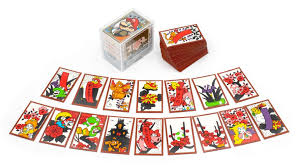Hanafuda: Difference between revisions
(Created page with "{{Infobox_Toy | toy_name = Hanafuda| toy_image = 300px| designer = various| manufacturer = various| release = 18th century - present| added_to_museum = Mario: December 22, 2018| }} '''Hanafuda (花札, "flower cards")''', are playing cards that originated in Japan in the late 18th century. They have their distinctive image-based design due to the ban on Western-style playing cards instituted by...") |
(link playing cards) |
||
| (One intermediate revision by the same user not shown) | |||
| Line 8: | Line 8: | ||
}} | }} | ||
'''Hanafuda (花札, "flower cards")''', are playing cards that originated in Japan in the late 18th century. They have their distinctive image-based design due to the ban on Western-style playing cards instituted by Japan in that era. | '''Hanafuda (花札, "flower cards")''', are [[playing cards]] that originated in Japan in the late 18th century. They have their distinctive image-based design due to the ban on Western-style playing cards instituted by Japan in that era. | ||
[[Nintendo|Nintendo Koppai]] (任天堂骨牌, "Nintendo Cards"), founded in 1889 to distribute handmade Hanafuda cards, was instrumental in popularizing this style of playing cards. | [[Nintendo|Nintendo Koppai]] (任天堂骨牌, "Nintendo Cards"), founded in 1889 to distribute handmade Hanafuda cards, was instrumental in popularizing this style of playing cards. | ||
| Line 22: | Line 22: | ||
When demand began to overwhelm his ability to produce the handmade cards on his own, Yamauchi hired a small team to help him create the cards. His cards had become so popular that by the early 20th century, he opened up another card shop in Osaka, Japan. | When demand began to overwhelm his ability to produce the handmade cards on his own, Yamauchi hired a small team to help him create the cards. His cards had become so popular that by the early 20th century, he opened up another card shop in Osaka, Japan. | ||
[[Category:Club Nintendo | [[Category: Club Nintendo]] | ||
[[Category:My Nintendo | [[Category: My Nintendo]] | ||
[[Category:Playing cards]] | [[Category: Playing cards]] | ||
Latest revision as of 01:37, 2 October 2024

| |
| Hanafuda | |
| Designer | various |
|---|---|
| Manufacturer | various |
| Released | 18th century - present |
| Added to Museum |
Mario: December 22, 2018 |
Hanafuda (花札, "flower cards"), are playing cards that originated in Japan in the late 18th century. They have their distinctive image-based design due to the ban on Western-style playing cards instituted by Japan in that era.
Nintendo Koppai (任天堂骨牌, "Nintendo Cards"), founded in 1889 to distribute handmade Hanafuda cards, was instrumental in popularizing this style of playing cards.
History
In 1549, missionary Francis Xavier landed in Japan and the crew of his ship had carried a set of 48 Portuguese Hombre playing cards from Europe. The cards became in Japan, however after the country banned contact with the West in 1633, Western-style playing cards were banned as well.
A number of playing cards were developed in Japan to try to circumvent the ban, but the government banned each iteration due to its association with gambling. Eventually, card games with images instead of numbers were developed to get around these anti-gambling laws, and by the late 18th century, the first Hanufuda cards were developed. By the late 19th century, laws against Hanufuda and other image-based cards were relaxed, as their potential use in gambling was seen to be lessened due to a lack of an obvious numbering system that was present in Western-style playing cards.
Nintendo
Nintendo was founded by Fusajiro Yamauchi on September 3, 1889, following the relaxation of laws against playing cards in Japan. The company was founded in Kyoto, in an area that was well known for Yakuza activity. Yamauchi used this to his advantage, originally producing handmade Hanafuda playing cards. Nintendo's Hanafuda cards soon began to be used in Yakuza gambling parlors.
When demand began to overwhelm his ability to produce the handmade cards on his own, Yamauchi hired a small team to help him create the cards. His cards had become so popular that by the early 20th century, he opened up another card shop in Osaka, Japan.